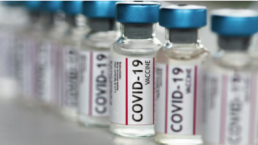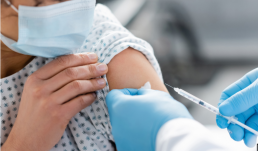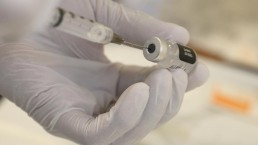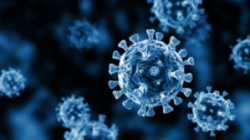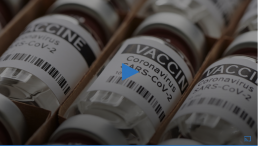Update on treatment of Covid-19 in CLL patients
CLLANZ Newsletter August 2021 - Update on treatment of Covid-19 in CLL patients
It is well recognised that the immune response to Covid 19 infection of individuals with CLL is markedly poorer than that of the general population, with associated increased hospitalisation rates, and increased mortality from the disease. It is thought that about 40% of patients with CLL do not develop an adequate antibody response to Covid 19 infection, or to Covid 19 vaccinations.
For this reason we can be much encouraged by the major recent therapeutic development of a monoclonal antibody to treat or reduce the risk of developing acute Covid 19 infection.
This antibody is known as Ronapreve in the UK and REGEN-COV in the US, and is a combination of two antibodies, casirivimab and imdevimab. It is produced by Regeneron Pharmaceuticals with Roche. Roche is the NZ distributor.
It can be given to at-risk patients as a single dose, IV or subcutaneously after any exposure to a Covid 19 infected individual or with the development of Covid 19 symptoms, in particular for those with a reduced/absent Covid 19 antibody response such as CLL patients. It has been shown to reduce dramatically the rates and duration of the clinical illness (80%), hospitalisation rates (70%), and mortality (25%).
Anyone with CLL who gets Covid 19 symptoms, or has close contact with someone with Covid 19 infection, should immediately self-isolate and call Healthline. But they should also ask the medical staff making their assessment about consideration of this monoclonal antibody as treatment for their condition.
Other monoclonal antibodies are also in the pipeline in relation to Covid 19, including tocilizumab, currently being considered by Pharmac for funding for cases of severe Covid 19 pneumonia.
There are additional aspects of Covid 19 infection risk-reduction that should also be part of all CLL patients’ plans/behaviour. Vaccination is of course the big one, and is central to prevention and reduction in severity of Covid 19 infection. There is mounting evidence that CLL patients should have three vaccination shots, the third being a ‘booster’, which is believed to improve the vaccine response especially in the subgroup with a low antibody response.
I’m sure you will be more than familiar with the other now routine infection-prevention measures such as wearing masks, avoiding crowds and poorly ventilated areas, regular hand washing and social distancing.
Stay safe!
With best wishes
Neil Graham
Responses to COVID-19 Vaccines Vary in Patients With Hematologic Malignancies
Responses to COVID-19 Vaccines Vary in Patients With Hematologic Malignancies
This article was originally published on Cancer Therapy Advisor
Patients with hematologic malignancies are known to be at risk of severe outcomes from COVID-19, and experts have recommended prioritizing these patients for COVID-19 vaccination.1,2
However, research has suggested that patients with hematologic malignancies may not mount an effective antibody response to vaccination.3
A study recently published in Cancer Cell provides insight into which hematologic malignancies and anticancer treatments confer a greater risk of poor antibody response, as well as which vaccine may be more likely to produce a response in patients with blood cancers.
To continue reading this article on Cancer Therapy Advisor
Pharmac commits to being more transparent
Priority lists for funding applications
On 28 July for the first time Pharmac released its ‘Options for investment list’. These are the priority medications Pharmac would like to fund if they had the budget to do so. They do not provide a ranking so we don’t know where each medication sits on the list. See the list here.
As a Cancer Patient, Will I Need an Extra Dose of a COVID-19 Vaccine?
As a Cancer Patient, Will I Need an Extra Dose of a COVID-19 Vaccine?
This article was originally posted on Patients Power
Individuals who are immunocompromised, including people with cancer, are wondering if they will need an additional dose of a COVID-19 vaccine to increase their level of protection against the coronavirus. The Advisory Committee on Immunization Practices (ACIP), which makes recommendations to the Centers for Disease Control and Prevention, met on July 22 to discuss this issue, among other topics. The meeting was a preliminary step in discussing the safety and effectiveness of additional vaccine doses before any new recommendations can be made.
When a person has cancer, there are two main reasons why they have an increased risk of infection: Either the disease itself or its treatment may cause suppression of the immune system. When this happens, a person may be considered immunocompromised. It is estimated that close to 3% of the U.S. population is immunocompromised, including those with solid tumors and blood cancers, people who have had organ or stem cell transplants, and those being treated with drugs that affect the immune system, including certain chemotherapy medications and corticosteroids.
While research indicates a very strong response to the COVID-19 vaccines in the general population, there is growing evidence that some people who are immunocompromised have a less robust immune response, even after they have been fully vaccinated.
Let’s review a bit. With rare exceptions, it is vital for everyone with cancer to get a COVID-19 vaccination as soon as they can, including those on most active treatments. Many experts at the ACIP meeting reemphasized the importance of vaccinations for people who are immunocompromised and further pointed out the key role of a “circle of protection” surrounding those who are immunocompromised consisting of other vaccinated individuals. It is important that all household members and others you are in close contact with are vaccinated.
Covid-19 Vaccines May Not Produce Sufficient Antibody Response in Transplant Recipients
COVID-19 Story Tip: Covid-19 Vaccines May Not Produce Sufficient Antibody Response in Transplant Recipients
This story was published on John Hopkins Medicine.
When clinical trials were conducted to determine the immunogenicity — the ability to elicit an immune response — for the first two vaccines marshaled against SARS-CoV-2the virus that causes COVID-19, one group was not among those included: people who have received solid organ transplants and others (such as those with autoimmune disorders) who are immunocompromised.
Now, Johns Hopkins Medicine researchers have tried to rectify that inequity, taking one of the first looks at how people who are immunocompromised respond to their first dose of one of the two mRNA vaccines — Moderna and Pfizer-BioNTech — currently being administered worldwide. Their findings, as published March 15, 2021, in a research letter in the Journal of the American Medical Association, disappointingly show that only 17% produced detectable antibodies against the SARS-CoV-2 virus.
“This is in stark contrast to people with healthy immune systems who are vaccinated, nearly all of whom mount a sufficient antibody defense against COVID-19,” says study lead author Brian Boyarsky, M.D., a surgery resident at the Johns Hopkins University School of Medicine.
The study evaluated the vaccine immunogenic response for 436 transplant recipients, none of whom had a prior diagnosis of COVID-19 or tested positively for SARS-CoV-2 antibodies. The median age was 55.9 years and 61% were women. Fifty-two percent were administered a single dose of the Pfizer-BioNTech vaccine and 48% received one shot of the Moderna vaccine. The median time since transplant for the participants was 6.2 years.
At a median time of 20 days after the first dose of vaccine, the researchers report that only 76 of the 436 participants (17%) had detectable antibodies to the SARS-CoV-2 virus. The researchers also found that among the 76 transplant recipients, the most likely to develop an antibody response were those younger than age 60 who did not take anti-metabolites for immunosuppression and who received the Moderna vaccine.
“Given these observations, we feel that the U.S. Centers for Disease Control and Prevention should update their new guidelines for vaccinated individuals to warn immunocompromised people that they still may be susceptible to COVID-19 after vaccination,” says study senior author Dorry Segev, M.D., Ph.D., the Marjory K. and Thomas Pozefsky Professor of Surgery and Epidemiology and director of the Epidemiology Research Group in Organ Transplantation at the Johns Hopkins University School of Medicine. “As the guidelines are currently written, people assume that vaccination means immunity.”
Segev says that upcoming studies will define the immunogenic response of organ transplant recipients and other immunocompromised patients after a second vaccine dose. Other studies will look at the impact of more extensive immune system profiling — including characterizing the immune cells that remember SARS-CoV-2 after vaccination and produce antibodies, or directly attack the virus in response to the presence of the virus — to help guide vaccination strategies for this population.
Boyarsky and Segev are available for interviews.
CLL Advocates Newsletter Issue 12
CLL Advocates Newsletter Issue 12
Dear Friends of CLLANZ
Covid-19 and CLL prevention and treatment – an update.
There is still a lot not known about this disease, but knowledge of it increases daily, and we will know a lot more about what to do to control the disease in coming months.
People who have CLL, and other leukaemias and blood cancers, are much more susceptible to the disease, have more severe disease, are more likely to be hospitalised when they get it, and are more likely to succumb to it than people with normal immune function.
Get vaccinated, if you have CLL.
Vaccination is safer than not being vaccinated – it reduces the severity of the disease, and the mortality rate, even though the vaccination response is reduced (it seems variably and complexly so) in people with CLL.
Herd immunity, nationally and globally, mainly because of vaccination, remains the mainstay of keeping people with CLL safe.
Preventative measures, such as avoiding crowds, social distancing, wearing protective gear such as masks, and washing hands, all remain important measures in preventing disease transmission.
And if you do get it, there seem to be increasingly recognised therapeutic options that can help you. For example, dexamethasone and budesonide save lives, and ibrutinib may reduce the disease severity.
Conversely, some treatments cause immunosuppression, and so increased vulnerability to the disease.
At the moment, in NZ, we have very low rates of the disease, and minimal community transmission, so we’re in a good place to be for staying safe.
This might change if the delta variant becomes established here though – it is more infectious, more likely to need to be treated in hospital, and maybe more resistant to vaccination, especially in the context where a person has only had one dose.
So I hope you all stay well during the pandemic out there in CLL land.
Best wishes

Neil Graham
R. Gregory BD, discusses outcomes for patients with chronic lymphocytic leukemia and COVID-19.
R. Gregory Bociek, MD, discusses outcomes for patients with chronic lymphocytic leukemia and COVID-19.
This article was originally posted by Onclive
R. Gregory Bociek, MD, an associate professor of internal medicine, Division of Oncology and Hematology and program director, Hematology/Oncology Fellowship Program, University of Nebraska Medical Center, discusses outcomes for patients with chronic lymphocytic leukemia (CLL) and COVID-19.
One retrospective, multi-institutional study included 198 patients with COVID-19 and CLL across 43 institutions, according to Bociek. Data showed that approximately one-third of patients will not survive; the overall case fatality rate was 33%, Bociek says. Additionally, one-third of patients were intubated, or admitted to the intensive care unit, and 90% of patients were hospitalized.
Despite the fact that the investigators have done their best to collect data, they’re more likely to think of patients who are sicker, according to Bociek. Additionally, the first few papers to be released could make the situation seem more dire than it actually is, Bociek adds. However, several lessons can still be taken away from the paper, such as that patients with more comorbidities and organ dysfunction may represent more challenging cases, Bociek concludes.
CLL Advocates Newsletter Issue 8
CLL Advocates Newsletter Issue 8
Dear Friends of CLLANZ
New Zealand’s Covid 19 national vaccination programme kicked off last week.
For people with CLL, Covid 19 has additional risks above those of the general population.
There is an increased risk of infection, and, in particular, an increased mortality for CLL patients who get severe disease. Some of this relates to the age group typically affected by CLL, and some to the intrinsic immunodeficiency that is part of CLL.
In a recent study from the European Research Initiative on CLL (ERIC), about 80% of patients in a study on Covid 19 in CLL patients had severe disease. Over a third of these patients died of Covid 19 infection. Being on ibrutinib seemed to have a protective effect, reducing the severity of the disease.
Vaccination immune responses are reduced in people with CLL, so vaccination likely will not provide as good a level of protection in this group as in the general population.
There is much that has been found so far from vaccination programmes in other countries, and from the research that has been done, and that continues to be done.
There are many vaccines in development for Covid 19, and three of those have been approved for public vaccination programmes.
There are the mRNA vaccines of Pfizer/BioNTech, and Moderna; and the AstraZenica/Oxford vaccine that uses a chimpanzee cold virus as a vector. The latter, I am told, is considered safe to use in CLL patients by most UK haematologists.
Some other information to look out for:
- Studies are in progress regarding using more than one vaccine in the same individual.
- There was a study that used half the recommended dose for the initial vaccine and then a full dose for the second, which seemed to have been associated with a better outcome than the orthodox vaccine recommendation.
- The interval between vaccine doses when the vaccine is orthodoxly given in two doses is the source of some debate, and a longer interval seems OK.
- Response rates for vaccines in use has been high, with some variation in subgroups, but the duration of vaccine protection seems to be variable, and still being studied.
So, vaccination is recommended for people with CLL, and you should seek medical advice regarding getting your “jab”
Best wishes
Neil Graham
Case Study: COVID-19 and the Coexistence of CLL
Case Study: COVID-19 and the Coexistence of CLL
This article was originally published on Docwire News
Many symptoms of SARS-CoV-2 (COVID-19) can be concealed due the coexistence of malignant hemopathies such as chronic lymphocytic leukemia (CLL), according to a case report published in The Pan African Medical Journal.
In this case, an elderly man (76 years) who previously underwent surgery for colon cancer was admitted to intensive care for pneumonia. The patient presented with a dry cough, very high fever (104°F), swollen lymph nodes, and diarrhea. A polymerase chain reaction test was conducted and came back positive for COVID-19. A chest CT scan showed pulmonary opacities with consolidation. During his admission, the authors noted that the patient was conscious and breathing 85% at room air with intercostal retraction, with stable hemodynamics: blood pressure, 140/75mmHg; heart rate, 90 bpm; and 39°C fever. Electrocardiogram showed normal sinus rhythm, fixed duration of PR interval, and QTc at 475. Transthoracic echocardiography was normal, they added.
Lab tests conducted on his first day of admission showed the following: elevated white blood cell count at 140020el/mm3 and lymphocytes 129660el/mm3 (vs. 154000el/mm3 at D7), low hemoglobin at 8.9 g/dL, platelets at 464000el/mm3, prothrombin time at 64%, fibrinogen at 6.77 g/L, C-reactive protein at 130 mg/L, brain natriuretic peptide at 249 pcg/L, procalcitonin at 0.017 μg/L, LDH at 331 UI/L, ferritin at 563 μg/L, and troponin at 8.2 ng/L. A blood smeared displayed small lymphocytes with rounded nucleus and reduced cytoplasm. The patient was treated with four daily noninvasive ventilation sessions, hydroxychloroquine (200 mg, twice a day), azithromycin (500 mg/day), ceftriaxone (2 g/day) and moxifloxacin (400 mg twice a day), human immunoglobulins (0.5 g/kg single dose), anticoagulation, proton pump inhibitor, vitamin C, vitamin D, and zinc.
CLL and COVID-19: What Should Patients Know About Vaccines?
CLL and COVID-19: What Should Patients Know About Vaccines?
This article was originally published on Patient Power
What Vaccinations Should CLL Patients Receive?
With the flu season approaching and whispers of a vaccine for COVID-19 in the works, CLL patients with compromised immune systems may have questions about what vaccines they should be receiving, and if there are any risk factors involved. According to the experts, patients with CLL should schedule their flu shots right away, but what is recommended for a future COVID vaccine?
Listen in to find out more! Carol Preston, host and CLL patient advocate, will speak with Paolo Caimi, MD, Hematologist/Oncologist at University Hospital (UH) Cleveland Medical Center on these important topics.
In the Future, Should CLL Patients Get a Vaccine for COVID-19?
Carol Preston:
There is no vaccine at this time. We don’t know exactly when there will be a vaccine. And we know as CLL patients that we are only supposed to have dead vaccines as opposed to live viruses in a vaccine. So what is your thinking about a future COVID-19 vaccine.
Dr. Caimi:
What I am telling my patients is when the vaccine comes, we will first have to make sure that it’s safe. Second, I have to make sure that it’s safe for you. Meaning that for people with bad immune systems or people with half bad immune systems. Third, we’ll have to figure out with people who are less young, whether the dosing is different, whether the regimen is different. Then third, I’ll say probably what I’ll want them to do is to have everybody else around them vaccinated. Right?
So, in general, our patients are the ones who need to be beneficiaries of herd immunity, meaning everybody else’s immune to virus can’t touch them. And that’s probably what I would recommend them first to say, everybody else around you needs to be your barrier of protection for a vaccine. Once we figure out what the vaccine is going to be of benefit for you, maybe you need a different dosing, then we go ahead with it.
